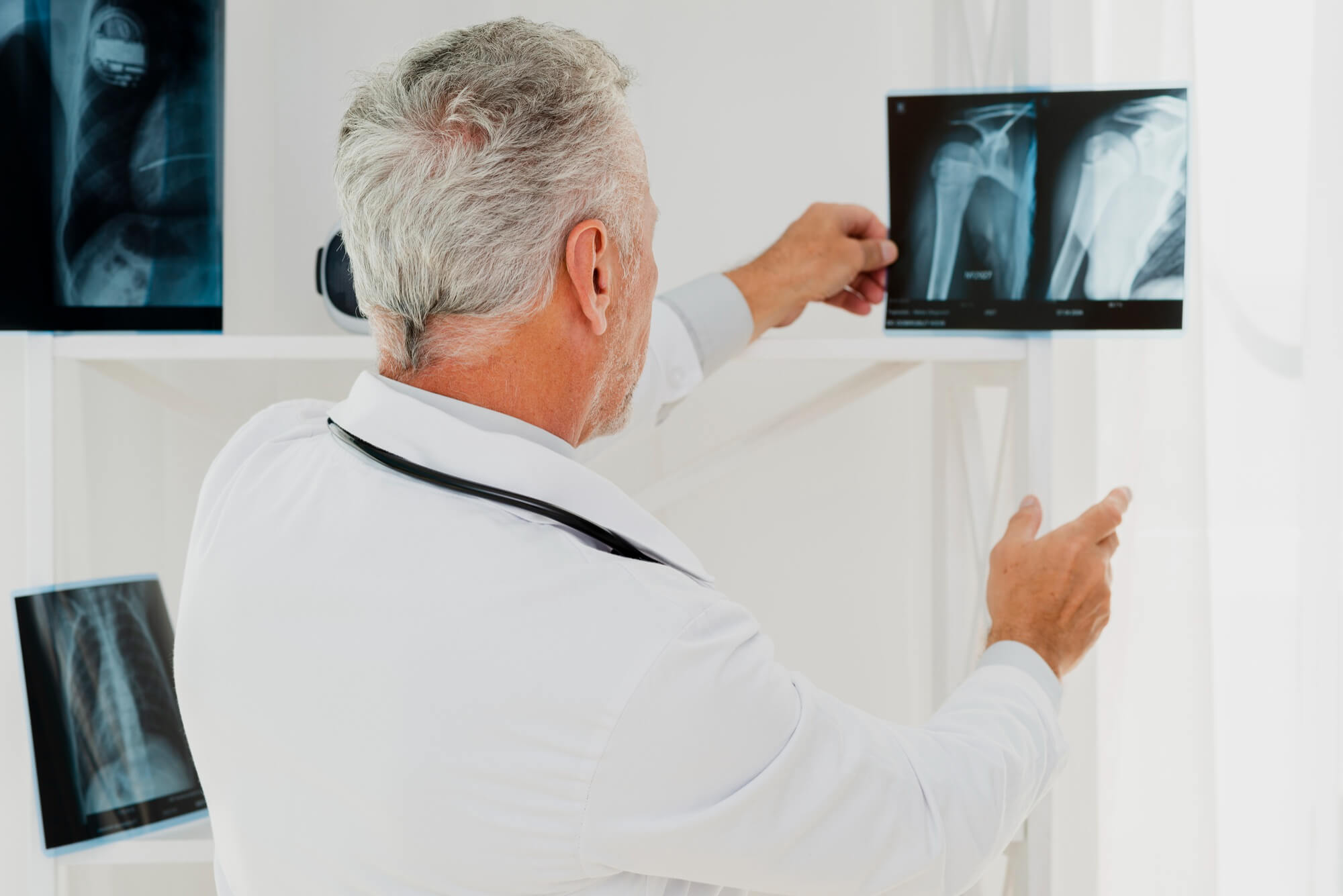The Rotator Cuff Tear Surgery
Get your quality of life back
Did you know that rotator cuff tear is one of the most common types of shoulder injuries? It can be very painful and may restrict your shoulder’s physical movement.
A healthy shoulder is vital for performing daily activities efficiently, but a rotator cuff tear can disrupt your daily living and cause significant discomfort. However, treatment of rotator cuff injuries is possible through surgical repair and other options.
This article includes everything you need to know about rotator cuff tear surgery to help you regain optimal shoulder and clavicle function.
Understanding rotator cuff tears and treatment options
The rotator cuff is a group of tendons that surround the shoulder joint and help to keep it stable. Understanding the anatomy of the rotator cuff and the types of rotator cuff tears improve treatment outcomes.
What is a rotator cuff tear and its Impact on shoulder function?
The rotator cuff is a group of four tendons that attach the muscles in the shoulder blade to the humerus (upper arm bone) in your shoulder socket. These tendons help to stabilize the shoulder joint and allow it to move smoothly.
A rotator cuff tear occurs when one or more of these tendons is torn. This can happen due to several risk factors, such as overuse, sudden injury, or aging. Rotator cuff disease is most common in people over the age of 40. There are different types of tears, including partial tears and full-thickness rotator cuff tears.
The main causes of these tears include:
- Acute rotator cuff tear: Caused by heavy lifting, outstretching arms, or traumatic injuries. It may occur along with damaged collarbone and shoulder dislocation.
- Degenerative tear: Caused by gradual wearing down of the tendon.
About the Impact on Shoulder Functions
Here are some of the impacts of rotator cuff tears on shoulder function:
- Shoulder pain: Rotator cuff tears can cause sharp or dull pain in the shoulder, especially when the arm is used for overhead activity.
- Stiff shoulders: These tears can cause stiffness in the shoulder, making it difficult to move the arm through its full range of motion.
- Weakness: Rotator cuff tears can weaken the shoulder, making lifting the arm for overhead activity difficult.
- Loss of range of motion: Rotator cuff tears can lead to a loss of range of motion in the shoulder, making it difficult to reach overhead or behind the back.
- Shoulder instability: Rotator cuff tears can make the shoulder joint unstable, which can lead to severe pain and weakness.
Rotator cuff tears can gradually sneak up on patients due to rubbing, chronic impingement, or trauma. A completely torn tendon (full-thickness tear) means that the detached muscle will atrophy and turn to fat. Unfortunately, chronic atrophy is irreversible.
If you are experiencing any of these common symptoms, it is important to see a doctor to get a rotator cuff tear diagnosis. Timely diagnosis can help to prevent further damage to the shoulder joint and lead to better treatment outcomes.
Ease your pain fast
Dr. Marc Beauchamp: the doctor for shoulder and elbow pain
About the Treatment Options
An MRI (magnetic resonance imaging) scan or an ultrasound is needed to confirm a diagnosis. After rotator cuff tear diagnosis, you must proceed to treatment options. There are a number of treatment options for rotator cuff tears, including:
Non-surgical treatment
In case of mild tears, non-surgical treatment might be the best option. This includes rest, ice, compression, and elevation (RICE) and a physical therapy program to strengthen the rotator cuff muscles.
There are several treatment options other than surgery for people with torn rotator cuffs.
- Some small or less painful tears can be treated with physiotherapy.
- Cortisone shots are used with caution, as they can make tears worse.
- Some overly chronic (inoperable) tears may be treated with physiotherapy or cortisone injections.
Another option is to use steroid injections. However, they may weaken shoulder muscles and reduce the success probability of surgery for rotator cuff tear.
Post-surgical recovery
Patients may be escorted home approximately one hour after their procedure. Numbness in the shoulder wears off after approximately 6 to 18 hours. It is recommended that patients take pain relievers during the first few days after surgery. A post-operative follow-up is required two weeks after the procedure to remove the patient’s stitches.
Surgical treatment
In case of massive tears and intense injury, surgical treatment is the way to go. It involves joining the torn tendon back with the upper arm bone or anchor removal of bone spurs. There are various shoulder surgery techniques used to repair a rotator cuff tear. They include arthroscopic procedures, open tendon repair, tendon transfer, mini-open repair, and shoulder replacement.
The best rotator cuff repair option depends on the severity of the tear, the patient’s age, and their overall health. A reliable orthopedic surgeon considers all the crucial factors to suggest the most suitable treatment for the patient. The sooner a tendon is repaired following the tear, the greater the patient’s chances of making a full recovery with no lasting repercussions.
About recovery
- Non-physical activities may be resumed the next day if pain levels permit.
- Non-strenuous activities may be resumed several days post-surgery (cooking, driving, writing, typing).
- Pendulum exercises must be performed starting the first several days to minimize the formation of adhesions.
- Patients can resume more strenuous activities after two to three months (exercise, swimming, tennis, carpentry). It is important to let the shoulder heal before starting strengthening exercises so as to avoid any new tears.
- Recovery rate: 90%
- Complication rate: less than 1%
Why choose Dr. Beauchamp for your rotator cuff tear surgery?
When opting for rotator cuff surgery, choosing an expert orthopaedic surgeon is crucial. Here is why choosing Dr. Beauchamp for your surgery for rotator cuff is the best decision:
Expert orthopaedic surgeon specializing in rotator cuff tear Surgery
Dr. Beauchamp, rated among the top three surgeons in Montreal, is renowned for his expertise in orthopaedic surgery. He specializes particularly in addressing rotator cuff tears. His extensive experience ensures you receive the highest quality care and the best possible recovery.
Choosing an expert orthopaedic surgeon ensures a smooth surgery and recovery phase.
Personalized Treatment Plans Tailored to Your Needs
When it comes to rotator cuff repair surgery, there is no one-size-fits-all solution. Dr. Beauchamp crafts personalized treatment plans, taking into account your specific condition and requirements. This individualized approach maximizes your chances of a successful recovery.
The Rotator cuff tear surgery process
Rotator cuff tear surgery is a procedure to repair a torn rotator cuff. It typically involves the following steps:
- Preoperative evaluation and consultation
- Surgical procedure
- Postoperative care
Preoperative evaluation and consultation
Before surgery, a comprehensive evaluation is conducted to assess the extent of the tear, history of trauma, and your overall shoulder health. The surgeon will discuss your options, answer your questions, and ensure you are well-prepared for the procedure.
- This is when they will assess your shoulder and discuss the potential risks and benefits of surgery.
- They may also ask the patients with rotator cuff tears about their medical history and symptoms and perform a physical examination of the shoulder.
- The surgeon may also order imaging tests, such as an MRI, to get a better look at the tear.
Surgical procedure and postoperative care
The surgical procedure to repair a rotator cuff tear is typically performed under general or local anesthesia. The surgeon will make an incision in the shoulder and repair the tear. The surgical method depends on the severity of the tear.
The patient may need to wear a sling to immobilize the shoulder for several weeks after surgery.
About Postoperative Care
Proper postoperative care is crucial for pain management of rotator cuff tears and quick recovery. Here are some things to remember during the postoperative care period:
- Follow your doctor’s instructions carefully.
- Follow your physical therapy exercise program as instructed.
- Avoid lifting heavy objects or doing activities that stress your shoulder.
- Take a pain reliever if your doctor has suggested it.
With proper care, most people fully recover from rotator cuff tear surgery.

Recovery and rehabilitation after rotator cuff tear surgery
Recovery from rotator cuff tear surgery typically takes 3 to 6 months after surgery. The rehabilitation program focuses on gradually increasing your range of motion and shoulder strength for continuous outcomes.
Some common exercises include:
- Range of motion exercises to help you move your shoulder through its full range of motion.
- Strengthening exercises to help you build strength in your shoulder muscles and promote bone healing.
- Proprioceptive exercises to help you improve your body awareness and coordination.
With active and passive exercises, your therapist improves the functional outcomes of the recovery. With proper care and rehabilitation, most people fully recover from rotator cuff tear surgery.
Individualized rehabilitation programs for optimal recovery
Recovery varies among patients, and Dr. Beauchamp tailors rehabilitation programs to meet your specific needs. These programs are designed to enhance strength, flexibility, and function in your shoulder, ensuring a successful recovery.
Some important factors affecting your rehabilitation program include:
- Your overall health
- Your history of trauma
- The severity of your tear
- Your age and activity level
- The type of surgery that you had
The rehabilitation program usually includes a combination of active and passive exercises, stretching, and other activities on an outpatient basis.
Ensuring long-term shoulder function and strength
Dr. Beauchamp’s commitment to your well-being extends beyond surgery. He focuses on preserving and enhancing your long-term shoulder function and strength, allowing you to confidently return to your active lifestyle.
After you have recovered from rotator cuff tear surgery, it is important to take steps to ensure long-term shoulder function and strength. This includes:
- Maintaining a healthy weight
- Strengthening your core muscles
- Continuing to do your physical therapy exercises
- Avoiding activities that put stress on your shoulder
Consider seeing a physical therapist or other healthcare provider for regular checkups. It will improve continuous outcomes of the recovery program.
Contact Dr. Beauchamp for your rotator cuff tear evaluation
Say no to excruciating rotator cuff pain and get the right help timely. With access to the right expert, there is hope for a pain-free, fully functional life. Contact Dr. Beauchamp’s office and explore the best treatment options tailored to your needs.
No more shoulder pain due to rotator cuff tear when you have access to the right expert. Contact Dr. Beauchamp, the best orthopaedic surgeon in the town, to get the best treatment.
Ease your pain fast
Dr. Marc Beauchamp: the doctor for shoulder and elbow pain
FAQs: Rotator Cuff Tear Surgery
Is rotator cuff tear surgery a major surgery?
Yes, rotator cuff repair surgery is a major surgery. In this surgery, the rotator cuff tendons are sewn back to the upper arm bone called the humerus. Patients may feel pain in the shoulder after rotator cuff repair surgery due to stiffness.
How long does it take to recover from rotator cuff surgery?
It takes around six to eight weeks for partial repair of the muscles after rotator cuff surgery. The time for complete recovery varies depending on different factors, including the severity of the tear, the type of surgery, and your health.





